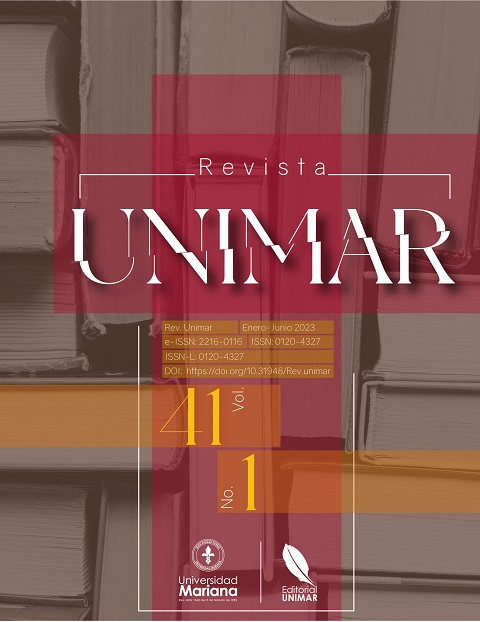Colombian and cultural bilingual impositions on the linguistic epistemologies of the south
DOI:
https://doi.org/10.31948/Rev.unimar/unimar41-1-art10Keywords:
bilingualism, culture, authoritarian patternsAbstract
The objective of this reflective essay is to analyze national and imperial bilingualism, to see how it affects the people who inhabit this country, not only from learning itself but from its impact on daily life. This article is thought on the theory that learning a foreign language brings with it the absorption of cultural aspects of the target language. It also exposes modern authoritarian patterns and the affectation of culture on education.
Author Biography
Alex Fernando Burbano Rosero, Universidad Unicomfacauca, Popayán, Cauca
Magíster en Estudios Interdisciplinarios del Desarrollo, Universidad del Cauca. Docente tiempo completo del Departamento de Idiomas, Universidad Unicomfacauca, Popayán, Cauca.
References
Almanzar, C. [@CarlosAlmanzarR]. (2019, 14 de octubre). Ahora las torturas se llaman apremios ilegales. La traición se llama realismo [Tweet]. Twitter. https://twitter.com/CarlosAlmanzarR/status/1183719746388287488
Arias, C. y Angarita, A. (2010). Aproximación a los antecedentes del bilingüismo en Colombia y la formación de educadores bilingües. Horizontes Pedagógicos, 12(1). https://horizontespedagogicos.ibero.edu.co/article/view/130
Barrantes-Montero, L. (2018). Phillipson’s Linguistic Imperialism Revisited at the light of Latin American Decoloniality Approach. Revista Electrónica Educare, 22(1), 1-19. https://doi.org/10.15359/ree.22-1.1
Boaventura de Sousa, S. (2010). Descolonizar el saber, reinventar el poder (J. Exeni, Trad.). Trilce.
Fraile, M. (2000). La globalización de la lengua inglesa y los estudios postcoloniales. Aula, 12, 69-85. https://revistas.usal.es/tres/index.php/0214-3402/article/view/3559
Montenegro, M. (2010, 17 de febrero). Mural de la Universidad del Cauca-Historia de la medicina en el gran Cauca, no destaca a las negritudes [Blog]. http://historico-ceharcaucablogspotcom.blogspot.com/2010/02/mural-de-la-universidad-delcauca.html
Redacción T21. (2015, 17 de julio). Las personas bilingües tienen más materia gris en el cerebro. Tendencias. https://tendencias21.levante-emv.com/las-personas-bilinguestienen-mas-materia-gris-en-el-cerebro_a40828.html
Resolución 12730 de 2017. (2017, 28 de junio). Ministerio de Educación Nacional. https://www.mineducacion.gov.co/1780/articles-363207_archivo_pdf.pdf
Said, E. (2008). Orientalismo (M. Fuentes, Trad.; 2.a ed.). Debolsillo.
Surth, L. (2015). El rol colonizador del lenguaje. Revista Estudios Culturales, 7(14), 27-36.
Toledo, V. y Barrera-Bassols, N. (2008). La memoria biocultural. La importancia ecológica de las sabidurías tradicionales. Icaria Editorial.
Universia. (2014, 25 de noviembre). Las personas bilingües son capaces de tomar mejores decisiones. https://www.universia.net/mx/actualidad/vida-universitaria/personas-bilingues-son-capaces-tomarmejores-decisiones-1115769.html
How to Cite
Downloads
Downloads
Published
Issue
Section
License

This work is licensed under a Creative Commons Attribution 4.0 International License.
Los autores que publiquen en esta revista aceptan las siguientes condiciones:
1. Los autores conservan los derechos de autor y ceden a la revista el derecho de la primera publicación, con el trabajo registrado con la licencia de atribución de Creative Commons, que permite a terceros utilizar lo publicado siempre que mencionen la autoría del trabajo y a la primera publicación en esta revista.
2. Los autores pueden realizar otros acuerdos contractuales independientes y adicionales para la distribución no exclusiva de la versión del artículo publicado en esta revista (p. ej., incluirlo en un repositorio institucional o publicarlo en un libro) siempre que indiquen claramente que el trabajo se publicó por primera vez en esta revista.
3. Se permite y recomienda a los autores publicar su trabajo en Internet (por ejemplo en páginas institucionales o personales) antes y durante el proceso de revisión y publicación, ya que puede conducir a intercambios productivos y a una mayor y más rápida difusión del trabajo publicado (veaThe Effect of Open Access).
| Article metrics | |
|---|---|
| Abstract views | |
| Galley vies | |
| PDF Views | |
| HTML views | |
| Other views | |




